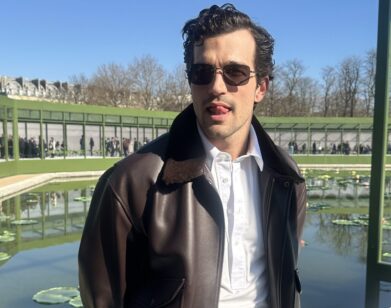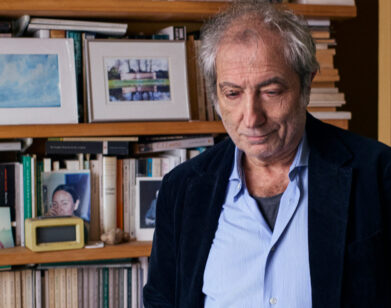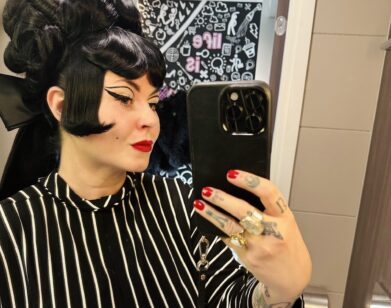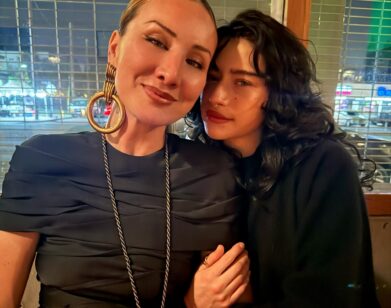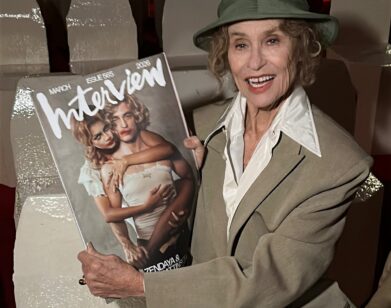Francois Sagat, Uncut
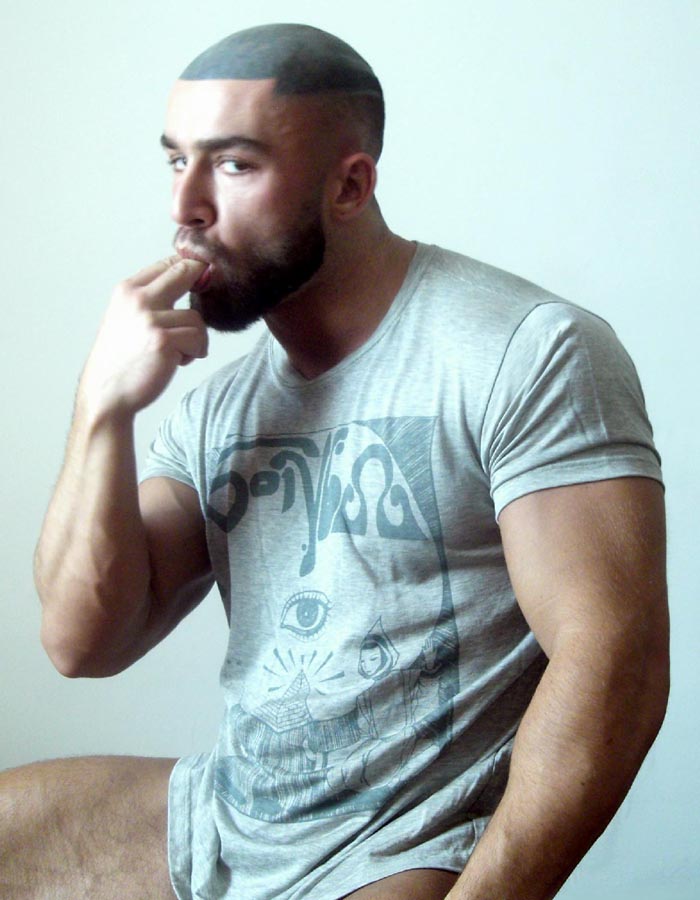
Thomas Persson, editor of biannual culture journal Acne Paper, is Interview’s guest blogger this week. The new issue of Acne Paper is on newsstands in Europe; look out for it stateside in the next month. Here, Persson discusses what didn’t make the, uh, cut:
Drawings by Fracois Sagat
In the world of gay erotica, French porn-star Francois Sagat has become something of a cult phenomenon. A painfully shy boy in his teens, Sagat grew up to be a strong, almost otherworldly muscle vision, representing the extreme end of gay body culture. What separates Sagat from his peers is his artistic involvement with designers such as Bernhard Willhelm as well as the French fashion label Fade where he can use his skills as an accomplished draftsman. I met Francois in a café by Centre Pompidou in Paris to talk about his trade, the power of body transformation, and why a man should never be afraid of his feminine sides.
THOMAS PERSSON: How does it feel to be the subject of so much sexual adoration and worship?
FRANCOIS SAGAT: I can’t say that I don’t like it but I think it’s too much. Too much for what it is. I understand if someone is a fan of Tina Turner or Cher. But being a fan of a porn star? I can understand the sexual obsession of someone because it’s a desire but being a fan of all the movies you have done, remembering which movies you did when and with whom, and what kind of beard I had in this particular film, that I don’t understand. But an obsession of the new Beyonce video and the choreography, the outfits, that is another story. That I do understand completely.
TP: You are especially discussed a lot on the Internet. With the enormous access to porn on the Internet the whole porn industry is changing.
FS: Oh yes, it has changed everything. All the companies in the US and everywhere are worried because they are loosing so much money. The only way to keep their audience is to stream videos online. Nobody wants to buy a DVD anymore. It’s like everybody wants a smaller computer or a smaller phone.
TP: I also think people have discovered that it is more erotic to see an amateur homemade flick on xtube, rather than the slick American porn film. The new kind of amateur porn has a kind of personal intimacy that you don’t get when it’s done professionally.
FS: Yes, I know. In the professional movies the image is very clear, you have a good edit, the guys are hot sometimes, but not always. But the less professional films are more exciting. You like to see amateurs. You like to see strangers. Much more so than seeing a well-known man having sex with another well-known man.
TP: Having become such a star in gay culture, what is it like for you going out on the gay scene?
FS: I don’t go out so much because I get recognized and I don’t like that. In the beginning it was kind of fun but now I freak out. They look at you. They look at what you wear. They look at what you buy, what kind of credit card you pay with, and I just want to escape.
TP: You have a large following of people who are very into you. Not only because of the porn but because you do all this other stuff, like making little films where you show that you are obviously not afraid to break with this very masculine image.
FS: Oh yes, and in that way I feel very secure. I don’t think playing with your femininity as a man is something feminine. I am not a model for masculinity, because I do have many feminine sides. I know some guys in this industry who are trying to push masculinity to the extreme, and it doesn’t work.
TP: We live in a time when people are obsessed about being fit. There are more gyms in the world than there ever was. Why do you think that is?
FS: Well, for me, I think a muscular body is sexually attractive. I am obsessed with my own muscles. I used to be this shy little boy. I am going to show you a picture of me when I was fifteen. You are not going to believe your eyes.
TP: Is that you? You look so tiny and cute. You have changed a lot since you were this shy boy. When did you start getting interested in creating this persona that you are today?
FS: I think it was when I finished fashion school. I was in a video that some friends had made and I didn’t like what I saw. I didn’t like my tiny body or the way I spoke. I was starting to loose my hair and it was a tragedy for me. I decided I wanted to change. I started training, not bodybuilding but fitness. In a year my body started to change. I shaved my skull and I did the tattoo.
TP: How did you feel when your body started to change?
FS: I felt relieved but all my friends reacted strongly. Everyone, except my best friend Olivier, rejected that I was changing. People thought I was fucking up my life. Others were laughing. But there were people, of a more intelligent kind, who thought it was an interesting transformation. But in the end I just believed in me, and I did what I had to do. And now everyone has accepted it.
TP: Because now you have become a famous gay icon. Did you have this in mind when you started your big transformation?
FS: No. I did it for my own happiness. I didn’t really think it would become such a big deal. I didn’t really plan to do porn, that just came my way and it worked. That being said, I think that I was made for porn. I’m not talking about the French experience because that was very intimate. I talk about the American experience.
TP: What is the difference between the French and the American experience?
FS: The French experience was very different. We were just three guys in the room: me, my partner and the guy that was filming. Six months later I arrived in the US and it was huge—a large house with a dozen people on the set. I was a little scared the night before but at the day of the shooting I didn’t even shake, which is quite strange for someone who used to be very shy.
TP: Gay culture often has the ability to fetish over things that are frightening, things that one perhaps wouldn’t like to experience in real life, such as prison, war and army barracks, complete submission, slavery.
FS: Perhaps because we are a minority and we are playing with things that we were repressed with before. Firemen, policemen, all these extremely masculine men that in a way represent the opposite of gay men, becomes a fantasy.
TP: Because the erotic is very much in the mind. It is about fantasies and dreams. Your profession is to visualize these fantasies somehow, so in one way you could say you are in fact living these fantasies through your work. But then the reality of it must be very different?
FS: I think I am less sexual than my image. I have experienced all the stuff, from bondage, fist fucking, golden showers. I have done all this stuff but my private sexual life is very different. I am not what people expect.
TP: And then you have this other image, which is much more artful and fun, such as the project with Bernhard Willhelm. How did that happen?
FS: Bernhard knew me from before, and I was familiar with his work. We met and he told me he was doing this project inspired by Peter Berlin.
TP: I love Peter Berlin.
FS: I saw him in San Francisco.
TP: You did? What did he look like?
FS: He looked like Anna Piaggi. [LAUGHS] No it’s true. He looked fashionable but in a good way. He looked like an old stylist. He did his own outfit, I guess. Anyway, Bernhard Willhelm and the photographer had this very precise vision. They had made a storyboard with me inside it, and I felt very honored. It was very structured. But Bernhard is very organized. It was a big deal for me to do that because it created a lot of publicity. I like it when people contact me and use me for their projects. I don’t go knocking on people’s doors.

